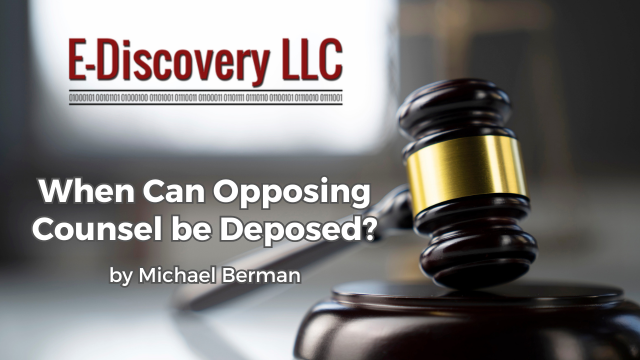
[EDRM Editor’s Note: The opinions and positions are those of Michael Berman.]
A four-factor test to answer the question of “when can opposing counsel be deposed?” was set out in Safo v. Singh, 2025 WL 2123613 (S.D.N.Y. Jul. 29, 2025), citing In re Subpoena Issued to Dennis Friedman, 350 F.3d 65, 72 (2d. Cir. 2003)(Sotomayer, J.). The four factors are:
(1) the need to depose opposing counsel;
(2) opposing counsel’s role in connection with the sought discovery and overall matter;
(3) the risk of encountering privileged discovery during opposing counsel’s potential deposition; and
(4) the extent of discovery already conducted.
Id. at *2.
Further, “the Second Circuit endorses a ‘flexible approach’ to lawyer depositions, where the court is to take into account all relevant facts and circumstances to determine whether the proposed deposition would entail an inappropriate burden or hardship,” considering those factors.
…the Second Circuit endorses a ‘flexible approach’ to lawyer depositions, where the court is to take into account all relevant facts and circumstances to determine whether the proposed deposition would entail an inappropriate burden or hardship…
Safo v. Singh, 2025 WL 2123613 (S.D.N.Y. Jul. 29, 2025).
Dr. Ann Olivarius is currently the plaintiffs’ attorney. She was also involved in underlying, relevant communications prior to assuming that role.
Defendants filed a motion to compel her deposition “on, among other subjects, her non-privileged communications with Plaintiffs and others prior to the formation of an attorney-client relationship, including her communications with donors and others at Mount Sinai concerning Singh and the allegations in the complaint, her purported personal inquiry into Singh, her decision not to proceed with the donation, her meetings with Singh, and her public relations campaign against Singh, Mount Sinai and others—all of which occurred when she admittedly was not acting as Plaintiffs’ counsel.”
Defendants represented that they would not inquire into privileged communications. “Defendants also argue that Dr. Olivarius’ current status as Plaintiffs’ attorney cannot shield her from questioning given her knowledge and involvement in the underlying facts.”
In reply, “Plaintiffs counter that the deposition should be limited to Dr. Olivarius’ direct communications with Dr. Singh before her retention as counsel or questioning of Dr. Olivarius should be restricted to written interrogatories.” In addition to several other arguments, plaintiffs argued that “discovery was mostly concluded and all the individuals Defendants identified in their motion have already been deposed, giving them a full opportunity to explore their questions in those depositions.”
The Safo court ruled: “Considering all four factors, this Court concludes that Defendants may depose Dr. Olivarius. Therefore, Defendants’ motion to compel the production of Dr. Olivarius is GRANTED. However, Defendants may not inquire about Dr. Olivarius’ current representation of the Plaintiffs or any current mental impressions.”
Factor 1 – the need for the deposition – weighed in favor of a deposition: “Defendants note that the extent of Dr. Olivarius’ investigation and the identities of whom she spoke to prior to becoming counsel is still unknown.”
Factor 2 – opposing counsel’s role – also weighed in favor of a deposition. To give only one example: “Here, both Parties agree that Dr. Olivarius, in her capacity as a potential donor prior to being retained as Plaintiffs’ counsel, met with Defendant Singh twice just days before an internal complaint was filed against him.”
Factor 2 – opposing counsel’s role – also weighed in favor of a deposition. To give only one example: “Here, both Parties agree that Dr. Olivarius, in her capacity as a potential donor prior to being retained as Plaintiffs’ counsel, met with Defendant Singh twice just days before an internal complaint was filed against him.”
Michael Berman on Safo v. Singh, 2025 WL 2123613 (S.D.N.Y. Jul. 29, 2025).
Factor 3 – the risk of encountering privilege – pointed in the same direction. The Safo court held that plaintiffs, having told the court that Dr. Olivarius was not then acting as their attorney, cannot now change their position. Id. at *2. Thus, there was little risk of encountering privileged information.
Factor 4 – extent of prior discovery – was deemed to be neutral. Defendants had moved to compel prior to the discovery cutoff and expert discovery had not concluded: “Thus, while significant discovery has taken place, much more discovery is likely still to come.”
Assisted by GAI and LLM Technologies per EDRM GAI and LLM Policy.


